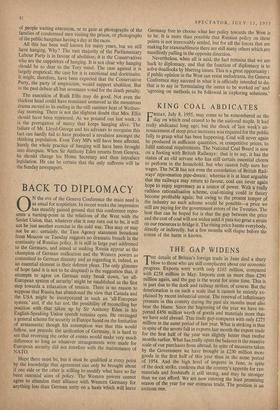THE GAP WIDENS
THE details of Britain's foreign trade in June deal a sharp blow to those who are still complacent about our economic progress. Exports were worth only £165 million, compared with £258 million in May. Imports cost us more than £290 million again, and the gap is the worst for some time. This is in part due to the dock and railway strikes, of course. But the deterioration is on such a scale that it cannot be entirely ex- plained by recent industrial unrest. The renewal of inflationary pressure in this country during the past six months must also bear the blame. Since the beginning of the year we have im- ported £456 million worth of goods and materials more than we have sold abroad. This trade gap compares with only £275 million in the same period of last year. What is striking is that in spite of the severe fall in exports last month the export trade for the first half of the year was slightly better than twelve months earlier. What has really upset the balance is the massive scale of our purchases from abroad. In spite of measures taken by the Government we have brought in £230 million more goods in the first half of this year than in the same period of 1954. And the high level of imports in June, in spite of the dock strike, confirms that the country's appetite for raw materials and foodstuffs is still strong, and may be stronger than we can afford. We are now entering the least promising season of the year for our overseas trade. The position is an anxious one.


































 Previous page
Previous page